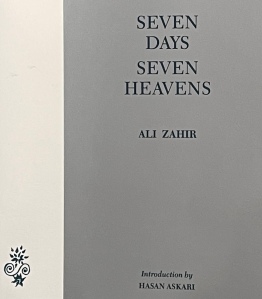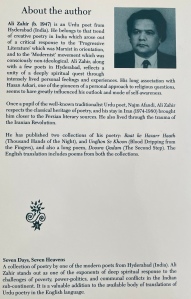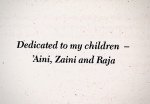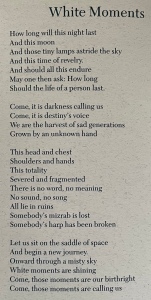Introduction by Hasan Askari, published 1991
Poetry is still one of the dominant modes of reflection and self consciousness in the Orient. It has somehow survived amidst all the threats a growing industrial culture presents, particularly in its impersonalising effects. In spite of all the stark contrasts of poverty and wealth, power and powerlessness, poetry, whether it is traditional or modern, continues to impart to people’s minds and hearts a sense of idealism and warmth.

Ali Zahir (19th February 1947 – 16th March 2003) is from Hyderabad, one of the major cities in India, a meeting point of several streams of cultures, religions and languages. Formally ruled by a Muslim prince, and now a part of the Indian Republic, Hyderabad has gone through a series of political, economic and cultural transformations which have led to the breakdown of old values, both religious and humanitarian, giving way to imbalance between the personal and the collective dimensions of people’s lives. Though Hyderabad maintained for a considerable time a sense of communal harmony which was fast disappearing from the other parts of India, it has collapsed over the last two decades into periodic outbursts of inter-religious hatred and violence thus wrecking the eclectic foundations of its semi-feudal culture.
Writers have responded to the challenges of modern India in three distinct modes – traditionalist, marxist, and modernist. The traditionalist approach involves the continuation of the classical literary forms, nostalgia for the late mediaeval culture, and a formal adherence to the rules and forms of art and poetry. The Marxist or the progressive school which thrived from the middle forties to the late sixties rested on a confident ideological mood that art and literature should reflect the people’s struggle against capitalism and imperialism. The modernist approach came about as a reaction to both the traditionalist and the marxist perspectives and claims. It was a revolt against formalism, both of form and ideology. It reflected the cry of the lonely individual for identity, recognition and communication. All the three modes have been generally humanist an agnostic.
Ali Zahir’s poetry reflects the traditionalist respect for form and the modernists emphasis on subjectivity. Having experienced the changes his city has undergone over the recent decades and also having worked in Iran during the years preceding the revolution there, Ali Zahir could witness the extremes from spiritual vacuum to religious enthusiasm. He could see both outside and deep within himself an urgent need for a new religiosity or sensitivity to both the psychological and political challenges. His poetry is one of the modes in which he expresses this quest.

The search begins with perception and remembrance of the human situation, of that predicament that envelops all humanity. Ali Zahir takes notice of the tragedies of the communal riots right within his own city, and points to the irrelevance of all the instructions of philosophy and ideology.
At the edge of the death of each abstraction
There is the mother, sister, brother –
Such tangible realities
Noticing the failure of both secularism and religion to give to India any relief from poverty and exploitation, Ali Zahir says:
For the oppressed and poor and humble, philosophy is a mockery that drains their very life force.
In Tiananmen Square, he says:
O Lovers! O Philosophers!
Bear witness, witness the
Blood of Chinese youth.
However critical of all those abstractions which empty the nations of the resources of humanity, Ali Zahir is drawn to the metaphysical mystery at the heart of life’s expressions both in pain and creativity.
“What is all this, dream or reality?” he asks.
The mood of his beautiful poem, Seven Days, Seven Heavens, bears witness to his quest for harmony, for meaning, and for the unity of reality behind all number and image:

Seven days
Seven heavens unfurled
Seven colours
Seven sounds
Architects of harmony.


From chaos to order, from loss of meaning to recovery of purpose, there is both a lifelong striving and at times a sudden leap into the depths of one’s being.
Within the heart
A spring
And within the spring, a flame
And within this flame of elemental yearning
There is another flame
The one which we call life.
Life, that mysterious all-embracing joy overflowing every cup and even at times drowning in its ecstasy the cupbearers as well, is one unending call of love, both the caller and the called all at once. There is the hearth of all reality – there is the abode of meaning and purpose. Hence, Zahir so truthfully regards all life as continuous communication, and he wonders: “How many garments that one spark has changed?”
Drawn to the heart of his own mystery, rejoicing in the variety of colours that one colourless unity puts on, and waiting at sunrise to hear the call of the “white moments” inviting him to step inward and then look, Ali Zahir brings to us in his poetry a new sensitivity nurtured in pain, linked with loneliness – a new religiosity without forms and rituals but not without courage and responsibility for both our inner and outer transformation. Those who are looking for the unity of mind and heart will find in Zahir’s poetry one of its most moving examples from the Indian subcontinent.
Hasan Askari



See also Hasan Askari’s 1995 speech in Hyderabad on Spiritual Humanism at which Ali Zahir and Musa Askari were present…. Hasan Askari says… “On that morning I said to Ali Zahir well, still there is light in this country. And perhaps we should begin from here again. Because in Indian tradition no other culture today talks about the soul so clearly and so continuously as India does.”
